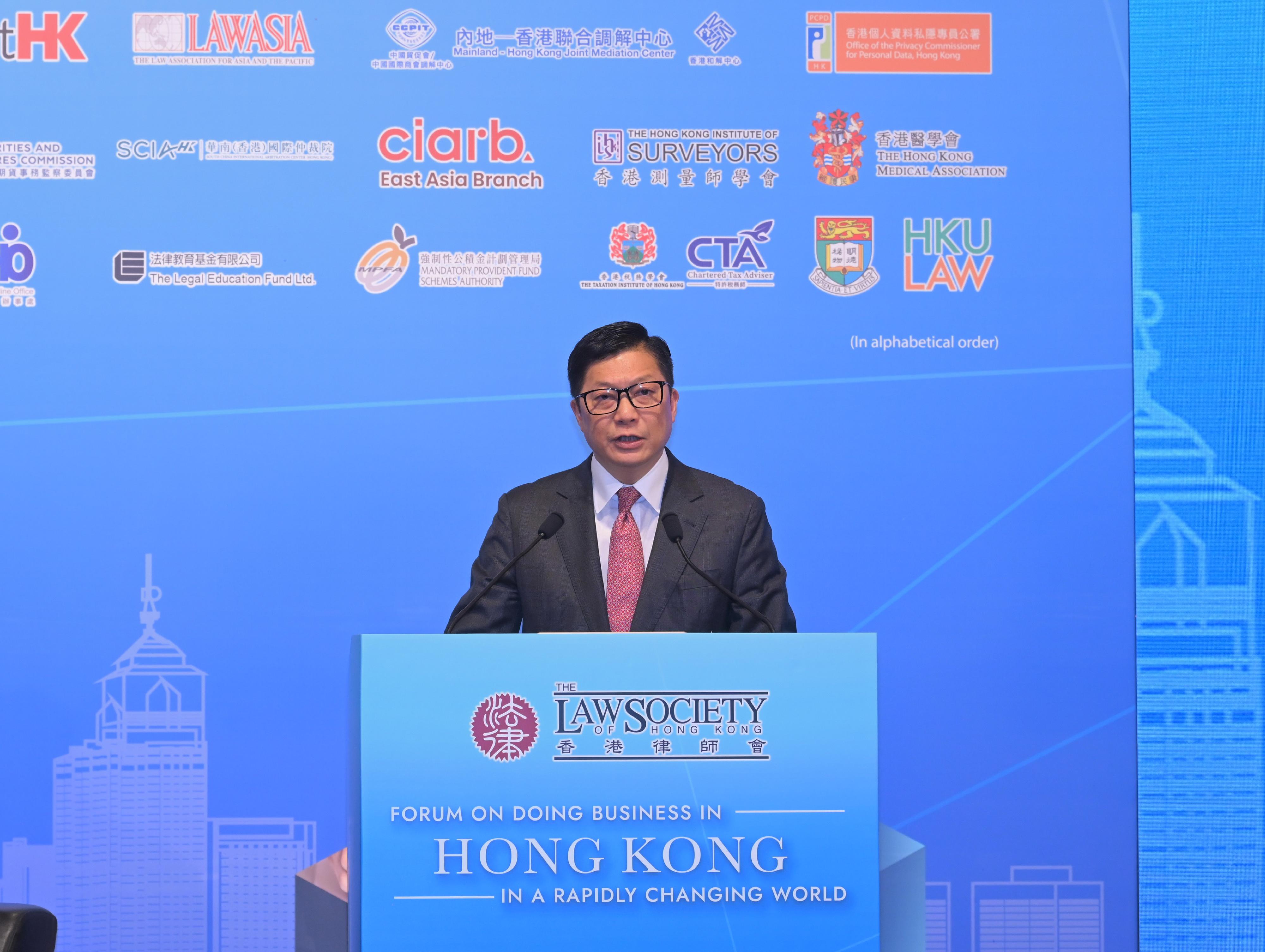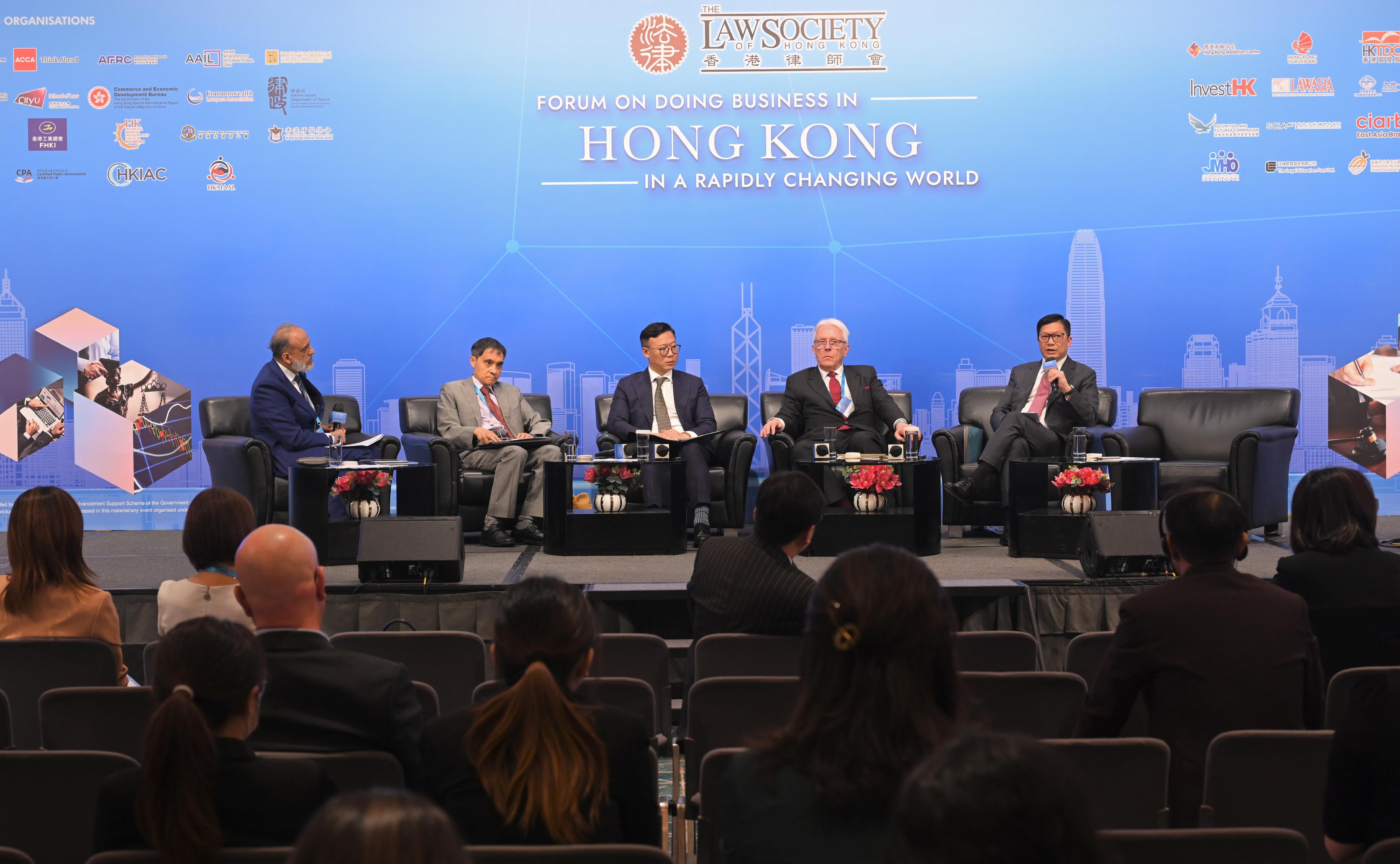Speech by S for S at Law Society of Hong Kong’s Forum on Doing Business in Hong Kong in a Rapidly Changing World (English only) (with photos)
Following is the speech by the Secretary for Security, Mr Tang Ping-keung, at the Law Society of Hong Kong's Forum on Doing Business in Hong Kong in a Rapidly Changing World today (July 11):
Dear friends and distinguished guests,
I am delighted to have the opportunity to provide a factual account of Hong Kong Special Administrative Region (HKSAR)'s work on implementing the National Security Law (NSL).
Effect of the NSL
As people of Hong Kong can see, after the implementation of the NSL, stability and security has been swiftly and effectively restored. As those of you who were in Hong Kong during the "black-clad violence" in 2019 may recall, members of the public who held different views were tied up, falsely imprisoned and assaulted by rioters. Shops and public facilities were vandalised. For many of you, it was not possible to do business in Hong Kong at that time. The whole scene was never "peaceful" or a "simple expression of opinions", as some overseas media and politicians attempted to portray. The NSL effectively restored the enjoyment of rights and freedoms which many people of Hong Kong, either locals or from overseas, had been unable to enjoy during the period of "black-clad violence". People living and businesses operating here in Hong Kong are relieved and happy to see Hong Kong now continues to be an open, safe and business-friendly city.
However, many overseas media and politicians have been turning a blind eye to all these facts and achievements by the HKSAR Government in restoring law and order. They have been laying false claims on the NSL. One of the false accusations is that the HKSAR Government has been "stifling dissent" and "persecuting opposition" using the law, and rights and freedoms of people of Hong Kong have been undermined. As the Secretary for Security, it is my responsibility to clear up these claims, so that the international community, in particular the business community, will not be misguided.
On enforcement actions
These claims are simply untrue.
The truth is: all law enforcement actions taken by law enforcement agencies are based on evidence, strictly according to the law and for the acts of the people or organisations concerned, and nothing more – not because of their political background. Since the implementation of the NSL, as regards cases involving suspected acts and activities that endanger national security, as at last week, 265 persons were arrested; 161 persons and five companies were charged in the cases concerned. All of the 80 persons who have their cases tried by our independent and impartial courts so far were convicted. After reading the relevant court judgments, one would no doubt agree that the prosecution cases have been well supported with evidence, and credit is due to our colleagues in the Department of Justice, and our courts have reviewed all evidence and adjudicated in accordance with applicable laws in an impartial and fair manner.
Some foreign media and politicians went on to suggest that certain arrestees should be released and charges should be dropped because of their status. Such propositions are totally unfair. Under the overarching principles of rule of law and equality before the law, it would be a hypocritical argument of politics overriding justice for anyone to advocate privilege for certain groups of people, such as media tycoon, and contend that they are above the law and should be immune to legal sanctions despite violating the law. Whether or not a person should be acquitted and hence released should be decided by the court based on facts and the law, and definitely not because of his or her background or political affiliation or whatever power behind them. This, I believe, is the same standard held around the world.
Freedoms and rights
As regards claims that the freedoms and rights have been undermined by the NSL, all measures or enforcement actions taken to safeguard national security must observe the principles stipulated in the NSL, which, as the Deputy Secretary for Justice has already mentioned, provides that human rights shall be respected and protected in safeguarding national security in Hong Kong, and the principle of the rule of law shall be adhered to when enforcing the NSL.
The HKSAR, in particular the law enforcement authorities and the Judiciary, ensure that rights and freedoms are protected in accordance with the law. The courts have already adjudicated upon a number of legal challenges on enforcement actions. A conscientious reading of the judgments will reveal that the courts have given due consideration to the rights and freedoms protected by the Basic Law and provisions of the ICCPR (International Covenant on Civil and Political Rights) as applied to the HKSAR, and struck a reasonable balance between the protection of national security and the protection of rights and freedoms.
It follows that the NSL does not affect the legitimate rights of Hong Kong residents to exercise their fundamental freedoms and rights, including criticising government policies or policies and decisions made by officials. Neither will freedom of information, academic freedom, policy studies, personal data privacy and general business activities be compromised.
It should be stressed, however, that these freedoms are not absolute. The two major international covenants on human rights – i.e., the ICCPR and the ICESCR (International Covenant on Economic, Social and Cultural Rights) – both permit restrictions if they are prescribed by law and for the protection of national security. And this is not something invented in Hong Kong – this is a common practice in countries around the world.
Repeal the NSL?
At times, there have been calls from foreign powers that the NSL in Hong Kong be repealed. Such calls, in my view, are totally untenable.
As a matter of fact, laws in safeguarding national security are not something unique in Hong Kong. Every jurisdiction will enact laws on safeguarding national security. This is an inherent right of every sovereign jurisdiction. The United States has at least 20 relevant items of such laws; Canada, Australia, New Zealand, the UK (United Kingdom), etc also have their own national security laws.
As many of you may be aware, the Home Secretary of the UK introduced in 2022 the National Security Bill into the UK Parliament. The Bill is wide-ranging, highlighting national security risks from foreign states including espionage, foreign interference in political system, sabotage, disinformation, cyber operations, etc, and expressing the need for the UK to "legislate to get ahead of this threat".
The UK Bill introduces a series of new offences of very wide coverage – for example, new offences of sabotage and foreign interference to guard against state-backed sabotage against critical sites, data and infrastructure; and a number of measures empowering the UK Police to detain arrested persons without charge for a maximum of 14 days, and the Secretary of State to impose in a targeted manner "state threat prevention and investigation measures" on individuals whom the Secretary of State reasonably believes to be involved in "foreign power state threat activity". Such restrictions cover a myriad of aspects including residence, travel, entry into area or place, movement, use of electronic communication device, financial services, work or studies, etc, and even a requirement to participate in polygraph sessions. The vast majority of the offences proposed in the Bill have extra-territorial application, regardless of the nationality of the person or place of establishment of the organisation committing the offence.
The above is just an example in the national security legislation scene worldwide. The calls for repeal of the NSL in Hong Kong only illustrate the bias and double standards of the foreign power.
That naturally takes us to the issue of the need to further enhance our laws in safeguarding national security. Although the social order has been restored after the implementation of the NSL, national security threats remain, just like other places in the world. It would be too naive to think that the national security threats to Hong Kong would be gone for good. To the contrary, activities of the criminals have gone increasingly "underground". There are also elements endangering the security of both the state and Hong Kong, who have absconded overseas, wantonly colluded with external elements, and continued to engage in acts and activities endangering national security, such as disseminating messages of separating Hong Kong from our country.
So the enactment of local legislation on Article 23 of the Basic Law is not just a constitutional responsibility of the HKSAR, but there are also practical needs to do so.
Ladies and gentlemen, I hope the above would help clear some misconceptions on the implementation of the NSL. In fact, "stability", and "security", and "prosperity" and "development" are complementary to each other. Business operations can only run effectively in a place with social stability firmly secured. The continued implementation of the NSL is essential in enabling us to ensure the continued stability and prosperity of Hong Kong, and also its ability to seize the unlimited opportunities offered by our mother country. Thank you very much.

